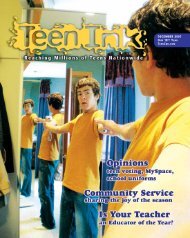You also want an ePaper? Increase the reach of your titles
YUMPU automatically turns print PDFs into web optimized ePapers that Google loves.
FOCUS<br />
COLLEGE<br />
FOCUS<br />
20<br />
Is the SAT Useless? by Caitlin Shea, Smithfield, RI<br />
Fall is a busy and stressful time for many high<br />
school seniors as they complete their college<br />
applications – gathering transcripts, teacher<br />
recommendations, and lists of extracurricular activities<br />
and awards, and sending them to colleges all<br />
over the country. The most nerve-wracking time for<br />
many, though, is waiting for their scores from the<br />
SAT, a test that has a tremendous impact on which<br />
schools will accept them.<br />
SAT stands for Scholastic Aptitude Test. The<br />
majority of colleges require it as part<br />
of their admissions process. More<br />
than two million students each year<br />
take this three-hour standardized test,<br />
which supposedly measures verbal<br />
and mathematical reasoning.<br />
Although colleges look at applicants’<br />
portfolios – including their GPA, class<br />
ranking, and special talents – SAT<br />
scores play a large role too. Many<br />
colleges will only accept students who attain a<br />
certain score for math and reading.<br />
I believe that SAT tests should not be the most<br />
important criteria for acceptance into a school. Studies<br />
have shown that females scored lower on the SAT<br />
than males, but overall women have better grades in<br />
high school and college. This shows that these tests<br />
do not necessarily predict success in college. Most<br />
professionals agree that SAT tests do have some<br />
validity, but there is much debate on whether scores<br />
should be the main factor colleges use to choose<br />
their freshmen.<br />
The SAT does<br />
not necessarily<br />
predict success<br />
in college<br />
Draw with <strong>Ink</strong> Used by Manga & Comic Artists<br />
Pigma Sensei — the ideal drawing set<br />
for art students to professionals.<br />
Start with Quality<br />
Pigma <strong>Ink</strong>: Rich black • Professional Grade • Archival<br />
Trusted by Manga and Comic Artists for 25+ years.<br />
Draw Whenever Creativity Sparks<br />
Easy-to-take-along set features pencil, eraser and<br />
Four Pigma ink pens in tip sizes from fi ne to bold.<br />
Manga Artists Share Drawing Tips<br />
www.MangaStart.com<br />
Sakura of America<br />
Creating quality tools to give you the Power to Express<br />
Pigma Sensei is Available Nationwide<br />
Find stores at www.sakuraofamerica.com/storelocator<br />
<strong>Teen</strong> <strong>Ink</strong> • APRIL ’09 • COLLEGE CONNECTION<br />
Another reason SAT tests are not a convincing<br />
predictor of academic success is that they are biased<br />
against minorities. The National Center for Fair and<br />
Open Testing, or Fair Test, believes that standardized<br />
tests like the SAT assume all test takers have backgrounds<br />
similar to white, middle-class students. This<br />
is certainly not the case. Fair Test seeks to eliminate<br />
the racial, class, gender, and cultural barriers to equal<br />
opportunity.<br />
When applying to the University of Texas, students<br />
in the top 10 percent of their<br />
class do not need to submit<br />
SAT scores. These applicants<br />
had higher college GPAs than<br />
those who were not in the top<br />
10 percent but had SAT scores<br />
200 to 300 points higher. This<br />
demonstrates that these scores<br />
do not necessarily predict<br />
students’ performance.<br />
My aunt received mediocre scores on her<br />
SAT tests. However, she graduated second<br />
in her class from Assumption College, went<br />
on to law school, and graduated in the top<br />
five of her class from Boston College. If the<br />
college had rejected her based on her SAT<br />
scores, they would have undoubtedly<br />
missed out on a superior student.<br />
Most successful students must work very<br />
hard in high school to earn the best grades<br />
they can. Students who get extra help, study,<br />
and try their best are the ones who tend to<br />
get good grades. Their work ethic determines how<br />
well they will do in the future. Therefore, a better<br />
way to predict students’ college performance is by<br />
looking at their previous achievements and grades. If<br />
colleges focus more on the accomplishments of the<br />
four years of high school rather than one test, they<br />
will more accurately determine how well students<br />
will perform in college. ✎<br />
Colleges’ Top Selection Criteria<br />
Private Public<br />
4-year 4-year<br />
institutions institutions<br />
Admissions test scores................................82% 70%<br />
Test of English as a Foreign Language.......79% 70%<br />
High-school record .....................................78% 79%<br />
High-school grades.....................................69% 66%<br />
College-preparatory program .....................48% 25%<br />
High-school class rank................................28% 20%<br />
Open admission ..........................................14% 14%<br />
Recommendations ........................................7% 51%<br />
Formal demonstration of competencies........5% 10%<br />
Number of institutions 595 1,243<br />
SOURCE: U.S. Department of Education<br />
®





